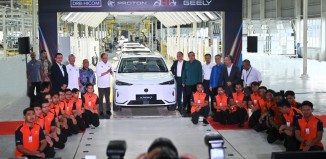Malaysia : EVs And Hybrids To Make Up 38% Of Total Industry Volume By 2040
The Malaysia Automotive, Robotics & IoT Institute (MARii) recently presented insights on the Electric Vehicle Development Plan in Malaysia at the 1st ASEAN Battery and EV Technology Conference 2023 (ABEVTC) in Bali, Indonesia. MARii is an agency of the Ministry of Investment, Trade and Industry (MITI).
This conference brought together experts and professionals from the EV industry in Southeast Asia with a purpose to create opportunities for knowledge exchange among professionals in the field of EVs and battery technology, and to establish an ASEAN community for future collaboration.
The conference was co-organised by the Singapore Battery Consortium (SBC), the National Center for Sustainable Transportation Technology (NCSTT) from Indonesia, the Thailand Energy Storage Technology Association (TESTA), and received support from Hioki E.E Corporation. The focus was on building vibrant ecosystems and strengthening partnerships among key players in the battery and EV sectors in the region’s pursuit of sustainable transportation.
 In his speech, Encik Azrul Reza Aziz, CEO of MARii, shared the EV Development Plan in Malaysia along with the National Automotive Policy (NAP) 2020. NAP 2020 serves as a policy framework that outlines the Malaysian government’s strategy to foster the growth of the EV industry. The policy places a strong emphasis on the development of green technology in the automotive sector, with a specific focus on EVs, in order to create a competitive and sustainable automotive industry in Malaysia.
In his speech, Encik Azrul Reza Aziz, CEO of MARii, shared the EV Development Plan in Malaysia along with the National Automotive Policy (NAP) 2020. NAP 2020 serves as a policy framework that outlines the Malaysian government’s strategy to foster the growth of the EV industry. The policy places a strong emphasis on the development of green technology in the automotive sector, with a specific focus on EVs, in order to create a competitive and sustainable automotive industry in Malaysia.
Azrul also highlighted the national targets set by the Malaysian government for the EV industry. These targets include a commitment to reduce carbon emissions by 45% by 2030, as part of the United Nations Framework Convention on Climate Change (UNFCC). The ultimate goal is to achieve net-zero carbon emissions by 2050, as per the 12th Malaysia Plan. The government is actively working to attract EV investments and aims to reach a target of 15% total industry volume (TIV) for EVs and hybrids by 2030, increasing to 38% of TIV by 2040. For the charging infrastructure, the objective is to establish 10,000 public EV charging stations by 2025.
“We are fully committed to achieving these national targets and are actively collaborating with industry players, academia, and government agencies to create an enabling environment for the growth of the EV industry in Malaysia,” said Azrul. He further emphasised that through initiatives such as skill development and workforce training, a skilled workforce would be cultivated in areas related to EV manufacturing, maintenance, and repair, while simultaneously promoting EV adoption in Malaysia.
“We firmly believe that by prioritising the initiatives outlined in the NAP 2020, the growth of the EV industry in Malaysia will not only benefit the environment but also contribute to the development of the local economy and the creation of high-value jobs. Malaysia has the potential to position itself as a leader in the region’s transition towards a more sustainable future,” added Azrul.
“Our participation in the 1st ASEAN Battery and EV Technology Conference underscores our commitment to advancing the EV industry in Malaysia and the broader region,” stated Azrul. “We believe that collaboration and knowledge-sharing are crucial for the development of the EV industry, and we are proud to have shared our insights and experiences with other experts and professionals in the field.”


























